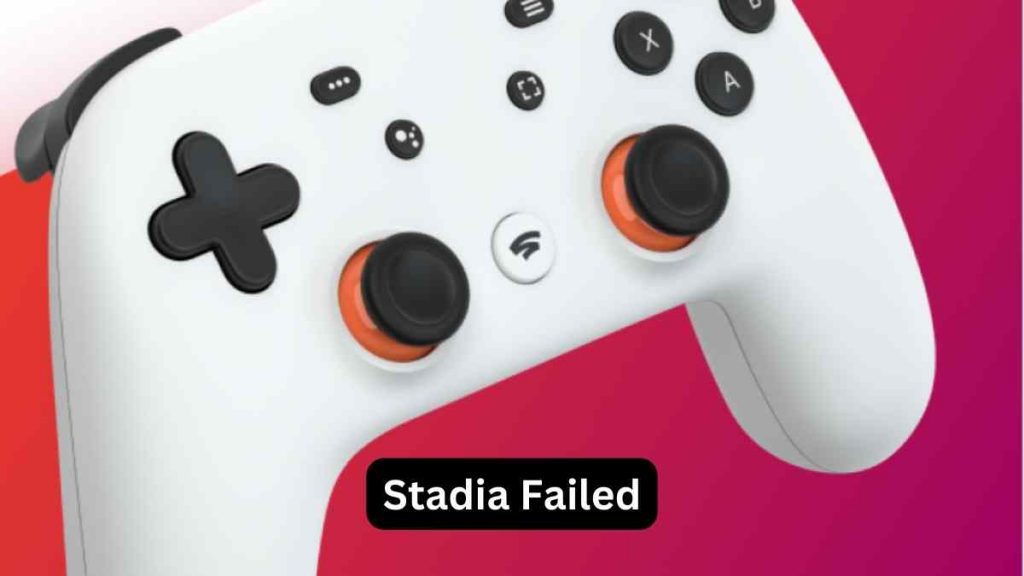Stadia Failed: Nobody Has Faith in Google There’s a lot of talk regarding Stadia’s “unexpected” shutdown. While rivals like GeForce Now and Xbox Cloud Gaming presented strong competition, the fundamental problem—as with most of Google’s products these days—was that no one trusted them to keep it alive longer than a year or two.
Nobody trusts Google. People are leery of investing in even its most popular products because it doesn’t comprehend what people want, need, or would pay for.

Stadia Failed: nobody has faith in Google
No complaints can be made about the technical execution. By Jove, they hit the claimed frame rates and reaction times. Stadia was superior to its competitors and almost miraculous in how it accomplished the promise of a one-second load time.
Never before has business been so inspiring. The much-mocked pre-launch hype exhibit for Stadia includes the disastrous Dreamcast, the meaningless Power Glove, and E.T. for Atari, a game so terrible it was buried in a shallow grave, followed by an empty pedestal for Stadia.
Google is shutting down its cloud gaming service Stadia
Even if the strategy was already in motion, no one had informed the social team, coders, or maybe even the CEO. According to reports, many personnel involved with the service were caught off guard by the decision. And who could blame them, given the company’s assurances that everything was great prior to the announcement.
For some, the writing was on the wall when Google disbanded its first-party development team for exclusive games before they could accomplish much. It’s possible that the corporation under-estimated the time required to create a game from scratch. no less than the time it takes to create a Google Doodle.
Without exclusives, it may have succeeded with a compelling product. Google Stadia was as meaningless and ostentatious as the Power Glove.
Not fullfill public expectations
I didn’t know who it was for, despite its outstanding execution. Most gamers who want to play Deathloop already have a console, gaming PC, or both. Why buy Deathloop for Stadia over PS5 or Steam? It will play and look better natively (albeit Stadia looked fantastic), plus they’ve put hundreds in those platforms.
You might play on your phone or laptop. But… the service already exists, and it’s not fantastic. Full-price games are intense, huge affairs where you sit for an hour or two with the surround sound blaring. I wouldn’t mind conducting inventory management on my laptop during a coffee break, but having access to AAA games isn’t much of an advantage.
Why was Stadia cheaper?
Genshin Impact is a AAA-level mobile game played by millions. Why was Stadia cheaper? It could have made sense if Google’s wizardry allowed you play PlayStation, Xbox, Switch, and PC games everywhere for $20 a month. Google would pay millions for a platform-agnostic bridge builder. Like Samsung:
Nope. You couldn’t play your games or utilise your controller. The entrance fee, monthly fee, and games were all full price.
It was doomed here. People will gladly pay a few dollars for a Google service, but no one will pay hundreds for something they think will be useless soon.
Beyond basic services, it’s unreliable.
Google is notorious for killing products. Its twists and turns on priorities, branding, standards, and everything else have shown that it can’t be trusted with anything beyond its basic services, and it even screws those up sometimes.
I still have my original Super Nintendo, which still works. My Mario Kart and Super Metroid cartridges are 30 years old. I can still play Steam games I bought a decade ago. If I dug out my PS3, the digital games would boot straight up. These organisations and services have proven for decades that they won’t cheat their clients.
Why was P.T. so upsetting? Unexpected: An aggressive and unnecessary destruction of digital goods. Betrayal stung gamers.
Google is the opposite. Outside of a few things no one wants to change, Google has built mistrust. For me (and dozens of others), the turning point was Google Reader’s death, which I will never forgive and for which I try to exact tiny vengeance by mentioning it regularly. But lots of other programmes have been extended, welcomed, and then killed (to repurpose the idiom).
Readme also
- Is far cry 6 cross platform: Co-op play with a friend
- Is madden 22 cross platform?
- Is Pyromancy in Elden Ring? A Complete Guide
- Lava Z60 FRP Unlock and Tool DL Image Fail Final Solution
- Error 2024: Path of exile unexpected disconnection
Final Words
Stadia Failed: nobody has faith in Google: Unfortunately, I don’t think Stadia ever had a chance to be successful. All of its plans were probably bound to fail from the beginning. However, if the product’s core is strong and it builds a sizable, invested community, then even a long shot can be shaped into a profitable product with a few pivots. For Stadia, that was never going to be the case. It’s clear that Google has done so much damage to its reputation that no community will ever trust it again, whether it’s content producers on YouTube, developers and scientists on Colab, or the media and advertisers in Search.




